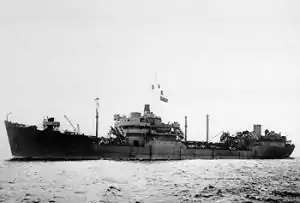RFA Wave King (A264)
RFA Wave King (A182) was a Wave-class fleet support tanker of the Royal Fleet Auxiliary built at Govan by Harland & Wolff Ltd. In 1945, she served in the Far East with the British Pacific Fleet, designated Task Force 57 upon joining the United States fleet.[3] On 6 May 1945 Wave King and Wave Monarch were with the Logistic Support Group 300 miles south-east of Miyako to refuel Task Force 57 which was launching air strikes against island targets in the Okinawa campaign.[3]
 | |
| History | |
|---|---|
| Name: | RFA Wave King |
| Builder: | Harland and Wolff, Govan |
| Yard number: | 1222[1] |
| Laid down: | 23 March 1943 |
| Launched: | 6 April 1944 |
| Completed: | 22 July 1944[1] |
| Commissioned: | 22 July 1944 |
| Decommissioned: | 1956 |
| Fate: | Scrapped in April 1960 |
| General characteristics | |
| Tonnage: | 8,159 gross register tons (GRT)[2] |
| Displacement: | 16,483 tonnes full load |
| Length: | 473 ft 8 in (144.37 m)[2] |
| Beam: | 64 ft 3 in (19.58 m)[2] |
| Draught: | 35 ft 4 in (10.77 m)[2] |
| Propulsion: | Parsons double reduction geared turbines,3 drum type boilers, 6,800 hp (5,100 kW). |
| Speed: | 14.5 knots (26.9 km/h) |
Wave King struck a rock north of São Luís de Maranhão, Brazil, on 9 August 1956 and suffered severe damage. She was withdrawn from service as a result and was laid up at Portsmouth later in 1956. She arrived at Barrow-in-Furness on 16 April 1960 for scrapping.
References
- McCluskie, Tom (2013). The Rise and Fall of Harland and Wolff. Stroud: The History Press. p. 154. ISBN 9780752488615.
- Lloyds (1944–45). "Lloyd's Register" (PDF). Lloyd's Register (through PlimsollShipData). Retrieved 9 October 2013.
- Gill, G. Hermon (1968). Royal Australian Navy 1939-1942. Australia in the War of 1939–1945. Series 2 – Navy. 2. Canberra: Australian War Memorial. pp. 604, 612.
This article is issued from Wikipedia. The text is licensed under Creative Commons - Attribution - Sharealike. Additional terms may apply for the media files.
